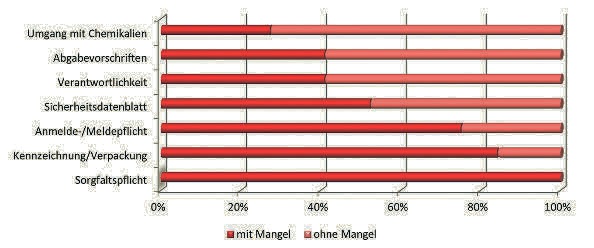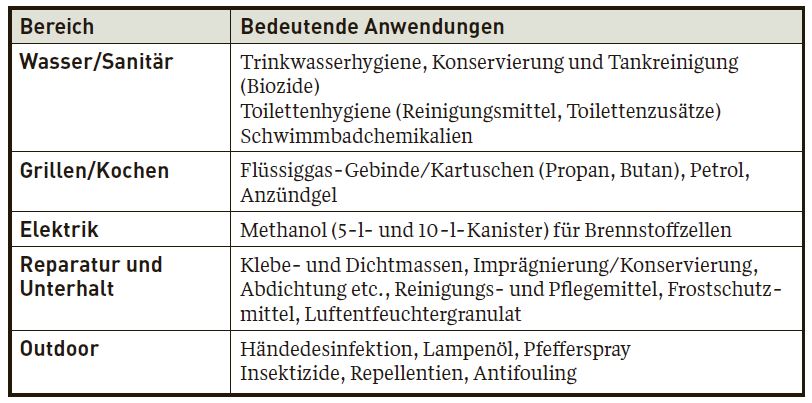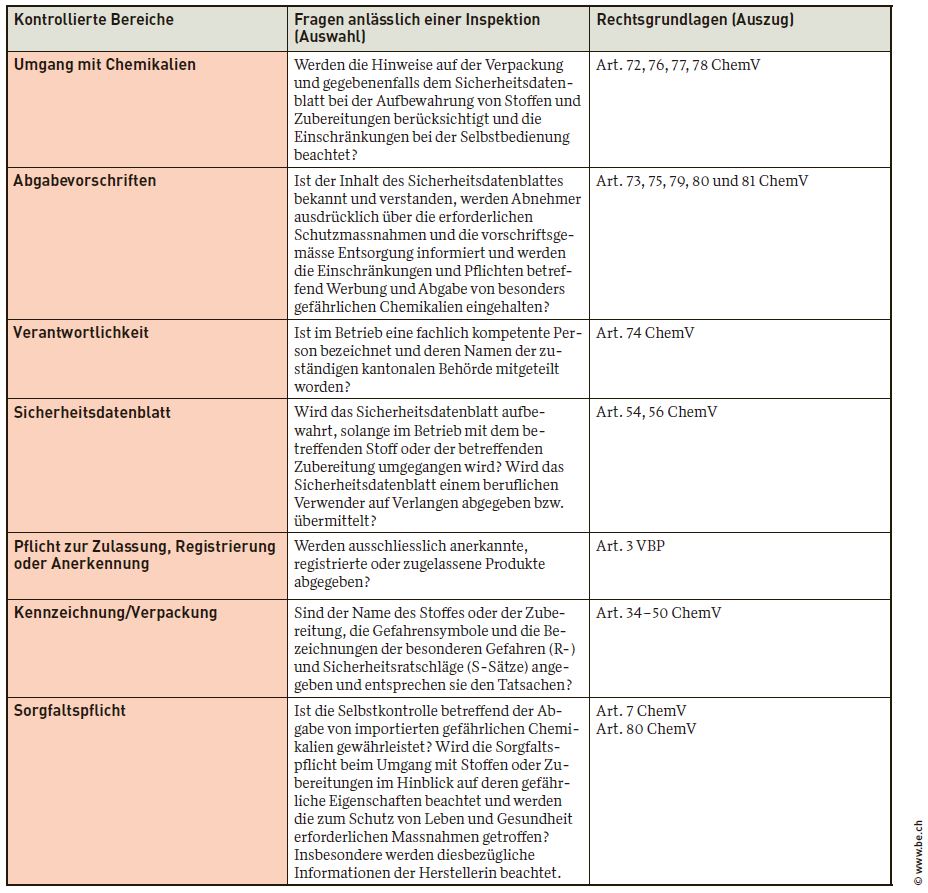Camping, comfort and chemicals
It is hard to imagine leisure activities without chemicals. Anyone who uses them must be informed about how to handle them safely. Good expertise on the part of the specialist trade plays a key role here. Official controls help to ensure this.

It's off with tent, caravan or motorhome. Everything is clean, maintained, glued, sealed, impregnated and preserved. The drinking water is treated and the toilet hygienic. Do we need lamp oil and insect spray? Are liquefied gas and kindling pastes available? Is the methanol for the fuel cells ready and a pepper spray included? Hygiene, comfort and safety are unthinkable today without chemicals. Not all are harmless to humans and the environment. Accidents have occurred during shipping, storage, use and disposal. Expertise in the trade and hazard warnings can reduce such risks. Of course, chemicals for the camping, nautical and leisure sectors, so-called public products, must not endanger people or the environment.
Specialty retailers in Switzerland import numerous consumer products from wholesalers in the EU. For defects in the distribution of such products, the local specialist retailer is legally responsible as a manufacturer (see box p. 17, top right). This even applies to catalogs and websites that have been taken over unchanged. Research in the canton of Berne uncovered deficiencies in expertise and information in advertising and on packaging in the specialist trade. Therefore, 70 specialist retailers with or without web stores in ten cantons were finally inspected by the competent authorities.
What is checked and how?
Anyone who supplies chemicals or chemical products must assess whether they may endanger human life or health or the environment. Such an assessment is very complex and is based on various legal provisions. These are found in the Chemicals Act, the Chemicals Ordinance (ChemO) and the Biocidal Products Ordinance (VBP).
The following requirements must be observed:
- for classification with regard to hazardous physicochemical, health and environmental properties.
- about packaging, labeling, safety data sheets etc.
- on the delivery of such products
The official control is based on the same legal bases. On-site inspections are mainly carried out from two angles:
- Are the legal framework conditions for dispensing chemicals met?
- Do the dispensed products meet the legal requirements?
The table below uses a selection of questions to illustrate the approach taken by inspectors when checking the various areas. The complex legal background can be assessed by means of a selection of quotations from the currently valid legal bases.

With what results?
Only just one-third (26) of the 70 specialty retailers met the legal framework for dispensing chemicals in 2012. Often, the necessary expertise on the dispensing of particularly hazardous products was lacking: Products not approved in Switzerland were advertised, or particularly hazardous chemicals were even found in self-service. During the inspection of the specialized trade on the basis of around 750 hazardous chemicals, more than 250 products were found to be defective. In the 26 specialty stores with deficiencies, mostly several control areas were objected to. About 75% of these establishments mastered "handling chemicals." Only 60% each still mastered "dispensing regulations" and "accountability." Fewer than 50% know their way around questions on the "safety data sheet" and "notification and reporting requirements". Over 80% of the deficiencies relate to "labeling and packaging" and finally 100% are insufficiently aware of their "duty of care". This is not surprising. After all, if, for example, products that are not authorized in Switzerland are dispensed, this can have an impact as a deficiency in the areas of: "obligation to declare/notify/authorize", "dispensing regulations", "labeling and packaging" as well as "responsibility" and "duty of care". So far, no criminal proceedings according to ChemG have been initiated.
Assessment
For imported products, the local specialized trade legally assumes the manufacturer's responsibility. In order to fulfill this role, importers must request the necessary information from their suppliers in the sense of a debt to be discharged. This insight is slowly beginning to take hold.
Four cantons reviewed the situation again in 2013. With good results:
- The required expertise was available.
- Adjustments to most catalogs and websites were underway.
- Toxic methanol, caustic cleaners, pepper sprays and the like were no longer dispensed in self-service.
- Biocides were either approved for Switzerland or no longer in the product range
Outlook
The results from 2013 show how specialist retailers are recognizing the potential dangers and risks and are increasingly taking their responsibility seriously. Due diligence is being incorporated into daily practice.
They are supported in this by the Cantonal offices for chemicals and the Federal Office of Public Health. This aims with its Information campaign by means of events and documentations in the same direction.











